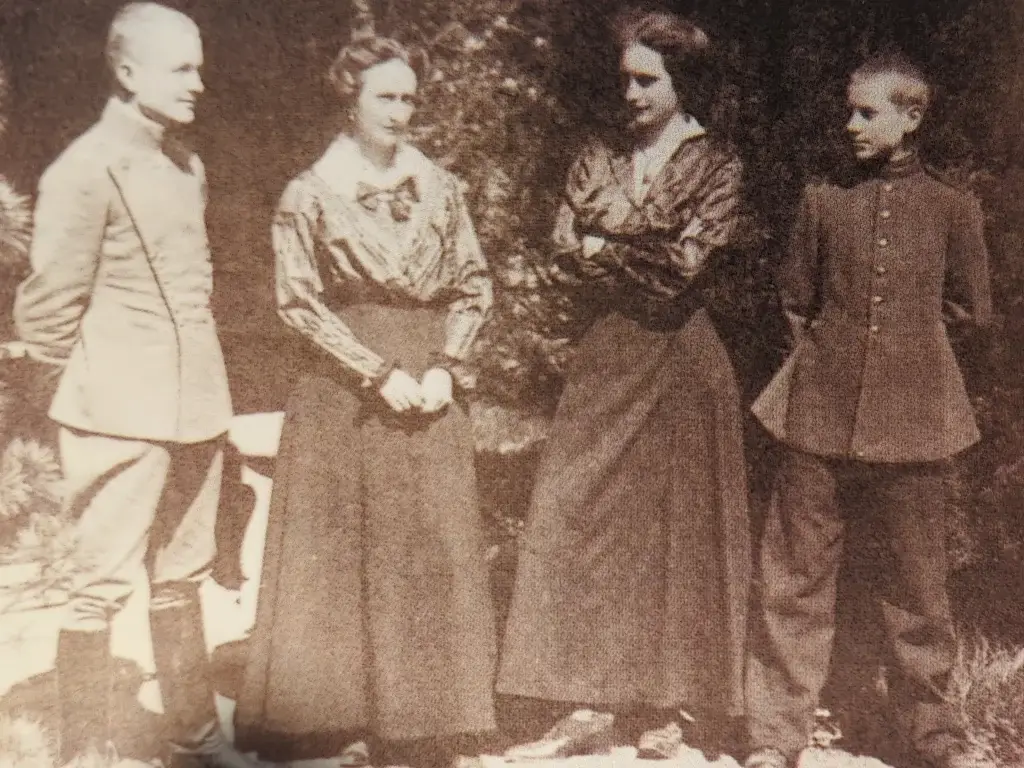Holiday
Event ID: 340
Categories:
04 February 1917
Source ID: 10
“It’s still early, the house is still asleep, the bitter cold makes you feel good in bed. I think I heard a ringing. I switch on the light, the clock points to seven o’clock in the morning. The door opens quickly and Manfred is standing in front of my net, fresh and happy, not a trace of tiredness after the long night’s journey. The blue star glitters on his neck – the Pour le mérite. I take his hand and say, as if praising the boy: ‘Bravo, you’ve done well, Manfred.’ And ask: “How did you get in? Was the garden gate already open?” No, it wasn’t, but that didn’t matter. The Knight of the Order pour le mérite had climbed over the fence. Let’s get to breakfast as quickly as possible, for morning coffee. No war brew, please! We scrape together a handful of coffee beans. They had been saved for a particularly festive occasion. That hour has now arrived. An inexhaustible flow of questions and stories begins. You can’t tell Manfred is tired! He looks fresher than ever. I watch him with pride. His face, it seems to me, has become even more closed. A willful face. But the amiable, well-cut mouth still has its charm. ‘Where have you been, Manfred?’ – An awkward, unpleasant thing. Recently, there had been a lot of cases of wings breaking off German planes in the air. He wanted to draw the attention of the responsible authorities in Berlin to this design fault. (Or was it perhaps a weakness in the material?) Manfred told us and we listened intently. His enemies called his aircraft ‘Le petit rouge’ because he had painted it bright red. I thought that was reckless, but he said: ‘You can’t make yourself invisible in the air, so at least they’ll recognise me.’ A beautiful image came to me at that moment. Didn’t Dietrich von Bern once also wear a fiery red shield? And didn’t people associate it with courage and strength? When evening came, it became even cosier. The thermometer outside showed a chilly 23 degrees. The rooms in the house were only moderately warm, but the large wood-burning stove in the outer room provided cosy warmth. So we sat down in a circle around it and listened to our air hero with undivided attention, even though the clock hand was slowly approaching midnight. What Manfred told us in his simple, straightforward manner was like the hymn of the fighter pilot. Solitary pride and chivalry – even among the British opponents; just as that Major Hawker, the British Immelmann, waved and smiled at Manfred in the frenzy of battle before the machine gun sheaf tore him out of the air. That was an attitude worthy of the old England and testified to the fine spirit of the Royal Flying Corps. I was less pleased with the behaviour of the eighteenth opponent that Manfred defeated before one of his wings broke. He hit the English aircraft hard, but gave the two occupants a break and was content to force them to make an emergency landing. He then had bad luck with his aircraft and only just managed to come down in a slow glide. When he spoke to the two prisoners after landing, they said that they would have shot at him when he landed if they hadn’t jammed… The good stove really means well. It holds us close with its warmth. The wind blows round the house. We have another cup of tea; a bowl of rum is on the table. Manfred has taken out a Berlin newspaper with yesterday’s date and hands it to us. It says that he shot down his nineteenth opponent. A late surprise, just before midnight. I can’t resist asking a question that perhaps wasn’t well thought out. “Why do you risk your life like this every day? Why are you doing this, Manfred?” He looks at me, seriousness written all over his face. ‘For the man in the trenches,’ he says simply. ‘I want to ease his hard lot, keep enemy planes away from him.’ And he is now talking about the simple soldier in the front of the trench, about the great, heroic passion of the stranger with his renunciate fighting and dying. His words are compelling, they make us see. The grey brother in the earth rises to the light. The many that no army report mentions by name. We look into their earth-coloured faces, which are as full of runes as there are days in war. The smoke of the material battle passes over them, the rumble of the guns is as if ingrown in their ears…For a moment, however, a sound is stronger than the roar of the artillery, it swells and roars like an organ and jerks their heads upwards – a German fighter plane, which has just been circling in the Elder Blue and sent an enemy to earth in the smoke of fire, shoots over the foremost positions. His fuselage is blood red. It sweeps low over the German trench – a roaring salute to you down there! – before it throws itself again, a shining arrow, against the blue disc of the sky and disappears. But those below, on their firing benches, behind their sandbags and breastplates, follow the red airman with their eyes as long as they can, the cry of enthusiasm still on their half-open lips… That night I understood what the essence of the fighter pilot is and what enabled these young people, who had barely outgrown their youth, to perform feats that made death a shadow.”

Comments (0)